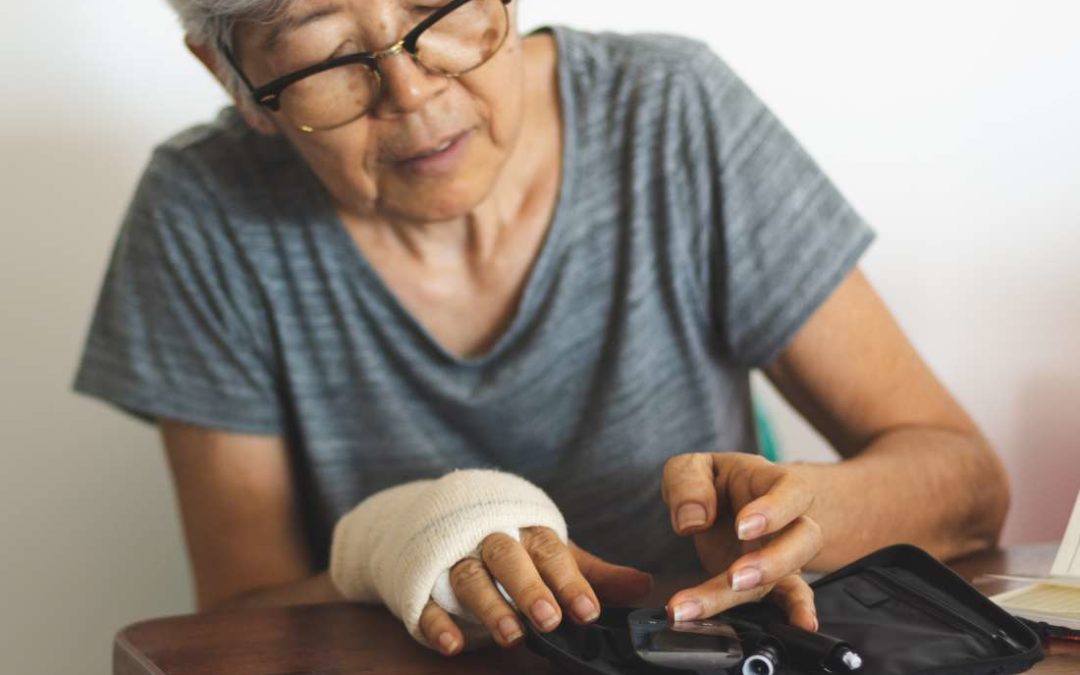What is Diabetic Hyperglycemia
Diabetic Hyperglycemia is a state of high blood glucose levels despite treatment. In which you are taking your medications or insulin, however; the levels of glucose in the blood are still high.

Signs of hyperglycemia
Diabetes mellitus has several types including type 1 and type 2. It requires treatment by insulin, medications or both.
Early and late signs and symptoms:
It shows different signs and symptoms that the patient suffers. The severity of symptoms depends on the extent of blood glucose levels and the duration of the high levels.
Early Signs of Hyperglycemia
The early signs are similar to a patient not knowing
That he/she has diabetes. The similarity comes from the idea that blood glucose levels are partially under control but the levels are still higher than the required levels for the patient. The levels of glucose are above 180 mg/dl.
The early signs include:
- Dry mouth: High glucose levels in the blood drives away water from cells and tissue leading to dryness of mouth
- Increasing the frequency of urination: High glucose levels drive water out. The volume of urine increases leading to more frequency of urination.
- Increasing thirst: This occurs due to water loss.
- Water loss.

It happens due to the inability of the body to use glucose, so it shifts to burn fats. Weight loss occurs mainly in type 1 diabetes.
- Fatigue
- Nausea and vomiting
- Headache
- Blurred vision
Late Signs of Hyperglycemia
Late signs are due to severely high levels of glucose in the blood above 200mg/dl and it sometimes exceeds 500 mg/dl.
The late signs include:

- Fruit-like breath odor: The odor comes from the use of fats and proteins and the formation of ketone bodies. Ketone bodies are responsible for the odor.
- Extremely dry mouth.
- Pain in the abdomen.
- Nausea.
- Vomiting.
- Severe fatigue.
- Shortness of breath and difficulty to breath.
- Confusion: Ketone bodies cross its way to the brain. They damage the brain.
- Coma.
- Muscles weakness.
- Severe dehydration.
- Heart rate increases.
Hyperglycemia causes
It depends on medications and the patient lifestyle.
Causes:
- Taking the wrong dose of insulin or oral medications for diabetes.
- Skipping a dose of insulin or oral medications.
- Improperly injecting insulin which causes loss of part of the dose.
- Taking expired insulin or oral medications.
- The doctor prescribed the wrong dose or drug.
- Not eating according to the dietary plan.
- Low physical activity.
- Stress: it increases substances and hormones in the body that increases glucose levels in the blood. Stress includes surgery, injury, emotional, and psychological, illness.
- Taking medications that increase blood glucose levels such as
- Steroids: To treat inflammation as in asthma, severe infections.
- Birth control pills.
- Thiazide diuretics: To treat high blood pressure or fluid accumulation in the body.
- Mental and antidepressant drugs.
- Progesterone: To support pregnancy or birth control.
- Catecholamines: They are normally present in our body like epinephrine, they are also present in the market as medications to treat diseases and conditions such as low blood pressure, low pulse rate, etc…
- Drugs that stimulate the liver to release glucose in the blood such as Theophylline: A drug that manages and treats asthma.
- Some antimicrobial drugs
- Anti-cancer drugs: They are drugs that induce damage and breakdown of cancer cells which lead to the release of glucose from the cells and the liver. The liver is the main organ of glucose storage.
- Drugs that are toxic to beta-cells of the pancreas. Beta cells are the cells that produce insulin. These drugs include certain anticancer drugs.
Hyperglycemia risk factors
The risk depends on factors related to the patient, the health status of the patient and blood levels of glucose.

Risk factors include:
- The patient age: Patients above 65 years old are at higher risk.
- You are obese or your weight is increasing: Patients with high or increasing weight are more able to develop more and more resistance of the body to insulin. It is riskier in type 2 than type 1 patients; because they already have insulin resistance.
- Other diseases such as that of heart, kidney, and polycystic ovary syndrome.
- If you are pregnant: During pregnancy, hormone levels change which normally increase slightly glucose levels in the blood.
- Race: If you belong to a non-white race such as African American. Hispanic, you are more likely to have high blood glucose levels.
- Diseases of the pancreas such as pancreatitis. Pancreatitis is the inflammation of the pancreas. The pancreas is responsible for insulin secretion. This factor is riskier in early and intermediate stage type 2 diabetes patients; because their pancreas is still producing some insulin.
- Vitamin deficiency such as vitamin A and vitamin D.
According to the Diabetes and Metabolic syndrome review March and April 2019, there is a relationship between vitamin D deficiency, hyperglycemia, and obesity.
- High triglycerides and Low-density lipoprotein: They are forms of fats in the body. Low-Density lipoprotein is a form of cholesterol in the body that is unhealthy.
- Infection.
Hyperglycemia complications
The negative impact of high blood sugar during diabetes depends on the levels of glucose and the duration of its elevation.
Complications include:
- Diabetic ketoacidosis: It is a state of severely high blood sugar levels in type 1 diabetes patients. It is due to the elevation of ketone bodies in the blood and their crossing into the brain.
- Hyperosmolar hyperglycemia: It is a state of severely high blood glucose levels in type 2 diabetes patients.
- Seizures.
- Heart diseases such as heart failure and infarction(death of the heart).
- Kidney diseases such as kidney failure.
- Brain stroke.
- Nerves damage which causes foot and hand problems such as numbness, changes in shape, etc…
- Infections of the skin, gum, lungs, etc…
- Gangrene is the death of cells plus the presence of infection.
- Eye problems such as cloudy vision, blurred vision and in the end, it leads to blindness.
- Damage of blood vessels.
- Bone damage.
- Deep and rapid breathing.
Chronic hyperglycemia complications
Emergency Complications of severe high blood glucose levels
It occurs when glucose levels exceed 600 mg/dl.
- Coma.
- Diabetic ketoacidosis development.
- Hyperosmolar hyperglycemic state.
- Gangrene.
- Shallow breathing.
- Kidney failure.
- Infarction of the heart:
According to a study in the Indian Heart Journal in November-December 2018, hyperglycemia can lead to death in patients with infarction of the heart.
- Severe dehydration.
Hyperglycemia prevention and complications:
- Educating the patient or a patient’s friend or relative about:
- how to take insulin and oral drugs.
- The dose they should take.
- when to take insulin and oral drugs.
- You should inform their doctors and dietician about the history of drugs or drugs that they are taking. They also should inform them of the types and amount of food they are eating.
- You should be physically active. It is better to make it a daily habit of at least 30 minutes of walking.
- Avoid sugar and high carbohydrates food.
- Take your insulin and oral drugs as the doctor prescribed.
- Take care of your self-hygiene especially your legs and feet.
- Generally, avoid taking antibiotics without a doctor’s prescription.
- Drink enough water daily.
- The most important thing is to monitor blood glucose levels and follow your dietary plan.

In conclusion, it is important for a diabetic patient to watch his blood glucose level. Make sure not to administer any medication without asking your physician first. Because this might interfere with your diabetic medication. Also, do not forget to follow the right diabetic diet plan.
Certainly, a slight divergent is okay if you need but never make this last.
Follow our blog for the rest of diabetic topics on:
https://fitnesshealthforever.com/
I am sure you will find them satisfactory and informative as well ;).



